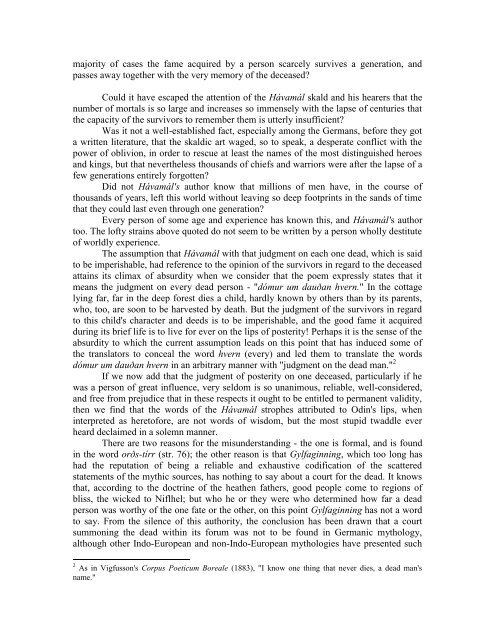Chapters 44-95 - Germanic Mythology
Chapters 44-95 - Germanic Mythology
Chapters 44-95 - Germanic Mythology
Create successful ePaper yourself
Turn your PDF publications into a flip-book with our unique Google optimized e-Paper software.
majority of cases the fame acquired by a person scarcely survives a generation, and<br />
passes away together with the very memory of the deceased?<br />
Could it have escaped the attention of the Hávamál skald and his hearers that the<br />
number of mortals is so large and increases so immensely with the lapse of centuries that<br />
the capacity of the survivors to remember them is utterly insufficient?<br />
Was it not a well-established fact, especially among the Germans, before they got<br />
a written literature, that the skaldic art waged, so to speak, a desperate conflict with the<br />
power of oblivion, in order to rescue at least the names of the most distinguished heroes<br />
and kings, but that nevertheless thousands of chiefs and warriors were after the lapse of a<br />
few generations entirely forgotten?<br />
Did not Hávamál's author know that millions of men have, in the course of<br />
thousands of years, left this world without leaving so deep footprints in the sands of time<br />
that they could last even through one generation?<br />
Every person of some age and experience has known this, and Hávamál's author<br />
too. The lofty strains above quoted do not seem to be written by a person wholly destitute<br />
of worldly experience.<br />
The assumption that Hávamál with that judgment on each one dead, which is said<br />
to be imperishable, had reference to the opinion of the survivors in regard to the deceased<br />
attains its climax of absurdity when we consider that the poem expressly states that it<br />
means the judgment on every dead person - "dómur um dauðan hvern." In the cottage<br />
lying far, far in the deep forest dies a child, hardly known by others than by its parents,<br />
who, too, are soon to be harvested by death. But the judgment of the survivors in regard<br />
to this child's character and deeds is to be imperishable, and the good fame it acquired<br />
during its brief life is to live for ever on the lips of posterity! Perhaps it is the sense of the<br />
absurdity to which the current assumption leads on this point that has induced some of<br />
the translators to conceal the word hvern (every) and led them to translate the words<br />
dómur um dauðan hvern in an arbitrary manner with "judgment on the dead man." 2<br />
If we now add that the judgment of posterity on one deceased, particularly if he<br />
was a person of great influence, very seldom is so unanimous, reliable, well-considered,<br />
and free from prejudice that in these respects it ought to be entitled to permanent validity,<br />
then we find that the words of the Hávamál strophes attributed to Odin's lips, when<br />
interpreted as heretofore, are not words of wisdom, but the most stupid twaddle ever<br />
heard declaimed in a solemn manner.<br />
There are two reasons for the misunderstanding - the one is formal, and is found<br />
in the word orðs-tírr (str. 76); the other reason is that Gylfaginning, which too long has<br />
had the reputation of being a reliable and exhaustive codification of the scattered<br />
statements of the mythic sources, has nothing to say about a court for the dead. It knows<br />
that, according to the doctrine of the heathen fathers, good people come to regions of<br />
bliss, the wicked to Niflhel; but who he or they were who determined how far a dead<br />
person was worthy of the one fate or the other, on this point Gylfaginning has not a word<br />
to say. From the silence of this authority, the conclusion has been drawn that a court<br />
summoning the dead within its forum was not to be found in <strong>Germanic</strong> mythology,<br />
although other Indo-European and non-Indo-European mythologies have presented such<br />
2 As in Vigfusson's Corpus Poeticum Boreale (1883), "I know one thing that never dies, a dead man's<br />
name."
















